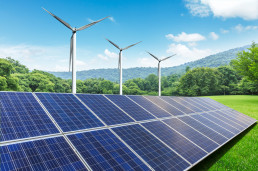General issues
This part of the project analyses the framework conditions for the use of renewable energy and the instrumental opportunities afforded by guarantees of origin. This includes, among other things, the consideration of regulatory innovations and challenges resulting from the national implementation of the EU Renewable Energy Directive (RED). The results are published in the form of several fundamental reports:
1. Verification systems for renewable energy
Besides guarantee of origin systems, there are other types of verification systems with different fields of application, e.g. for the verification of material properties or physical supply relationships. This report describes, among other issues, the different types of verification systems and their functions and purposes. In addition, their possible linkage with the physical, commercial or balance sheet delivery of energy is examined.
How can an industrial company support government climate efforts by switching to renewable energy? How can it ensure a sustainable energy supply for itself? The Fundamentals Report G1 “Verification Systems for Renewable Energy” addresses these questions by introducing readers to the world of renewable energy verification. The most important innovations from RED II are presented, e.g. the new regulations on guarantees of origin.
November 2021: Fundamentals Report G1 published
Fundamentals Report G1: Verification systems
for renewable energy
2. Purpose and instrumental scope of guarantees of origin
The comprehensive implementation of the energy transition requires a mix of instruments. In addition to analysing the current legal situation, it is therefore also necessary to work out the different objectives for the use of GOs and their conflicts with each other. This concerns, for example, the tension between consumer protection and the goal of promoting the transnational expansion of renewable energy at minimum cost.
Another topic is the interaction between GOs and other energy policy instruments, e.g. other RE support instruments or regulatory requirements. This study aims to identify opportunities and limitations for expanding the instrumental scope of GOs.
November 2021: Fundamentals Report G2 published
The Fundamentals Report G2 presents different areas of application and further development perspectives for the use of GOs. The starting points are the GO system in Germany and its national and European legal framework. The use of GOs for consumer information and the trading of renewable properties constitutes the status quo in Germany, while other uses would require a further development of the role of GOs. The report discusses the additional roles that GOs can fulfil, complemented by examples of interactions with the instrument mix of the German energy transition. Finally, an outlook is given on synergies and potential conflicts that need to be considered prior to expanding the scope of GOs.
Fundamentals Report G2: Purpose and instrumental scope of guarantees of origin - status quo and prospects for further development
3. How guarantees of origin can accelerate the energy transition
As explained in Fundamentals Report 2, the verification of renewable energy serves various purposes. What they all have in common is that they should support the energy transition. Fundamentals Report 3 examines the concrete form that this support can and should take. So far, the so-called additionality (added value for the energy transition) has only played a decisive role in the voluntary certification of green electricity products. In the definition of green hydrogen, the legislator has for the first time used the term “additionality” and made it mandatory.
Besides the possibility to securely transfer various pieces of information on a guarantee of origin, its tradability and pricing are of decisive importance for the question of whether and how GOs can contribute to financing the energy transition. For example, in the future, proceeds from selling GOs could increasingly generate relevant and reliable revenues for RE plants that are financed through power purchase agreements (PPAs).
Download Link für weitere Ergebnisse:
4. Sectoral, legal and transnational interfaces in renewable energy verification systems
Guarantee of origin systems have various interfaces with other systems. For example, they are tradable across Europe and interlock with the verification systems for the mass balancing or production of renewable hydrogen. Interfaces of GO systems for different energy forms (e.g. power and gas) also play a role as power-to-X applications are becoming increasingly relevant, especially in industry.
These interfaces must be analysed in order to avoid any incompatibilities and to minimise transaction costs. It is unclear whether and how a reliable transfer of the “green property” between different energy forms and infrastructures can be ensured. Therefore, a detailed analysis of the design options of the interfaces and the potential GO conversion options between the sectors is an essential part of this work package.
November 2021: Fundamentals Report G4 published
Fundamentals Report “G4 – Sectoral, legal and transnational interfaces in renewable energy verification systems” takes an in-depth look at the aforementioned interfaces and highlights particular challenges associated with linking different verification systems both within a country and across countries.
Fundamentals Report G4: Sectoral, legal and transnational interfaces in renewable energy verification systems






